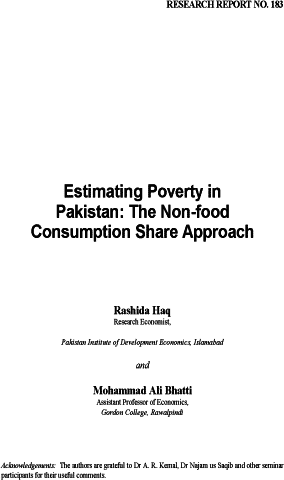Estimating Poverty in Pakistan: The Non-food Consumption Share Approach
Poverty alleviation is the most persistent challenge facing Pakistan since its inception. The underlying factors that create and perpetuate poverty involve a number of dimensions, e.g. income inequality, unemployment or underemployment, inadequate access to basic services and resources by the poor; inequitable distribution of assets, technology and socioeconomic opportunities; and underdeveloped infrastructure, etc. The persistence of poverty, moreover, reflects the poor’s varying state of vulnerability coupled with deprivation. The destitute differ in economic, social, geographic, physical and other characteristics so that reliance on increasing income alone is not likely to lead to sustained poverty alleviation in the country. Poverty in Pakistan has many dimensions and requires a multi-strategy solution.




